Mobile Technology Adoption and Customer Satisfaction in Hotels
VerifiedAdded on 2020/02/24
|52
|14512
|48
Report
AI Summary
This report investigates the correlation between mobile technology adoption and customer satisfaction within the hotel industry, utilizing the JW Marriott Hotel in Bangkok, Thailand, as a case study. The research, conducted over three months through questionnaires and interviews, explored customer satisfaction metrics aligned with Cresswell’s Research Onion and Equity Theory. The study aimed to determine if mobile technology significantly contributed to the hotel's high rating. Findings revealed an 83% overall satisfaction rating, although recommendations for future stays were lower at 65%. The report analyzes the rationale behind the hotel's selection, the implementation of mobile technology for check-in/out, and its impact on customer experience. It highlights the evolving role of mobile technology in the hospitality sector, emphasizing its significance in meeting customer expectations and enhancing guest experiences. The report also discusses the increasing trend of mobile technology adoption in hotels, particularly in Thailand, where it plays a crucial role in attracting and retaining customers. The study concludes with a call for further research to explore the factors influencing customer recommendations and provides valuable insights into the use of mobile technology to improve customer satisfaction and loyalty.
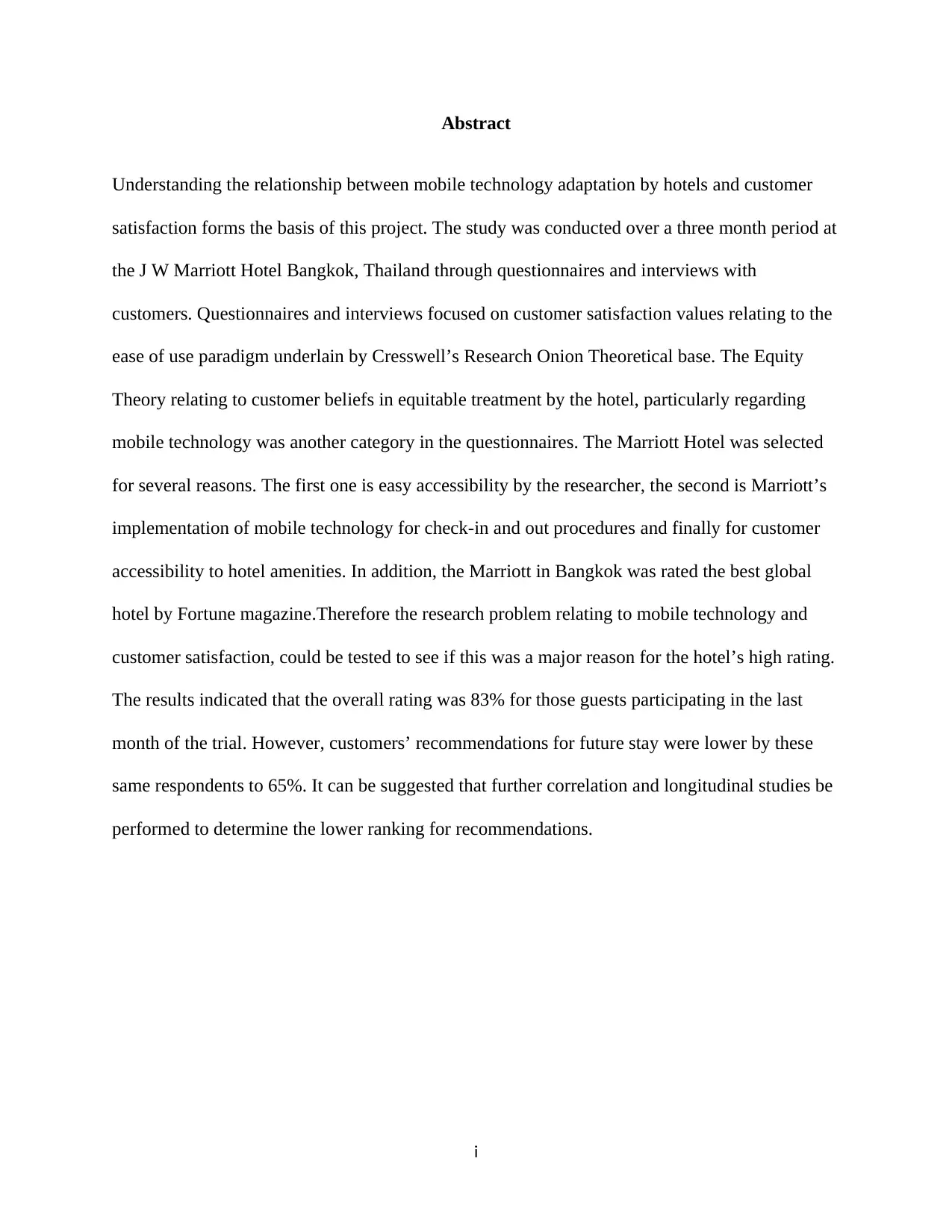
Abstract
Understanding the relationship between mobile technology adaptation by hotels and customer
satisfaction forms the basis of this project. The study was conducted over a three month period at
the J W Marriott Hotel Bangkok, Thailand through questionnaires and interviews with
customers. Questionnaires and interviews focused on customer satisfaction values relating to the
ease of use paradigm underlain by Cresswell’s Research Onion Theoretical base. The Equity
Theory relating to customer beliefs in equitable treatment by the hotel, particularly regarding
mobile technology was another category in the questionnaires. The Marriott Hotel was selected
for several reasons. The first one is easy accessibility by the researcher, the second is Marriott’s
implementation of mobile technology for check-in and out procedures and finally for customer
accessibility to hotel amenities. In addition, the Marriott in Bangkok was rated the best global
hotel by Fortune magazine.Therefore the research problem relating to mobile technology and
customer satisfaction, could be tested to see if this was a major reason for the hotel’s high rating.
The results indicated that the overall rating was 83% for those guests participating in the last
month of the trial. However, customers’ recommendations for future stay were lower by these
same respondents to 65%. It can be suggested that further correlation and longitudinal studies be
performed to determine the lower ranking for recommendations.
i
Understanding the relationship between mobile technology adaptation by hotels and customer
satisfaction forms the basis of this project. The study was conducted over a three month period at
the J W Marriott Hotel Bangkok, Thailand through questionnaires and interviews with
customers. Questionnaires and interviews focused on customer satisfaction values relating to the
ease of use paradigm underlain by Cresswell’s Research Onion Theoretical base. The Equity
Theory relating to customer beliefs in equitable treatment by the hotel, particularly regarding
mobile technology was another category in the questionnaires. The Marriott Hotel was selected
for several reasons. The first one is easy accessibility by the researcher, the second is Marriott’s
implementation of mobile technology for check-in and out procedures and finally for customer
accessibility to hotel amenities. In addition, the Marriott in Bangkok was rated the best global
hotel by Fortune magazine.Therefore the research problem relating to mobile technology and
customer satisfaction, could be tested to see if this was a major reason for the hotel’s high rating.
The results indicated that the overall rating was 83% for those guests participating in the last
month of the trial. However, customers’ recommendations for future stay were lower by these
same respondents to 65%. It can be suggested that further correlation and longitudinal studies be
performed to determine the lower ranking for recommendations.
i
Paraphrase This Document
Need a fresh take? Get an instant paraphrase of this document with our AI Paraphraser
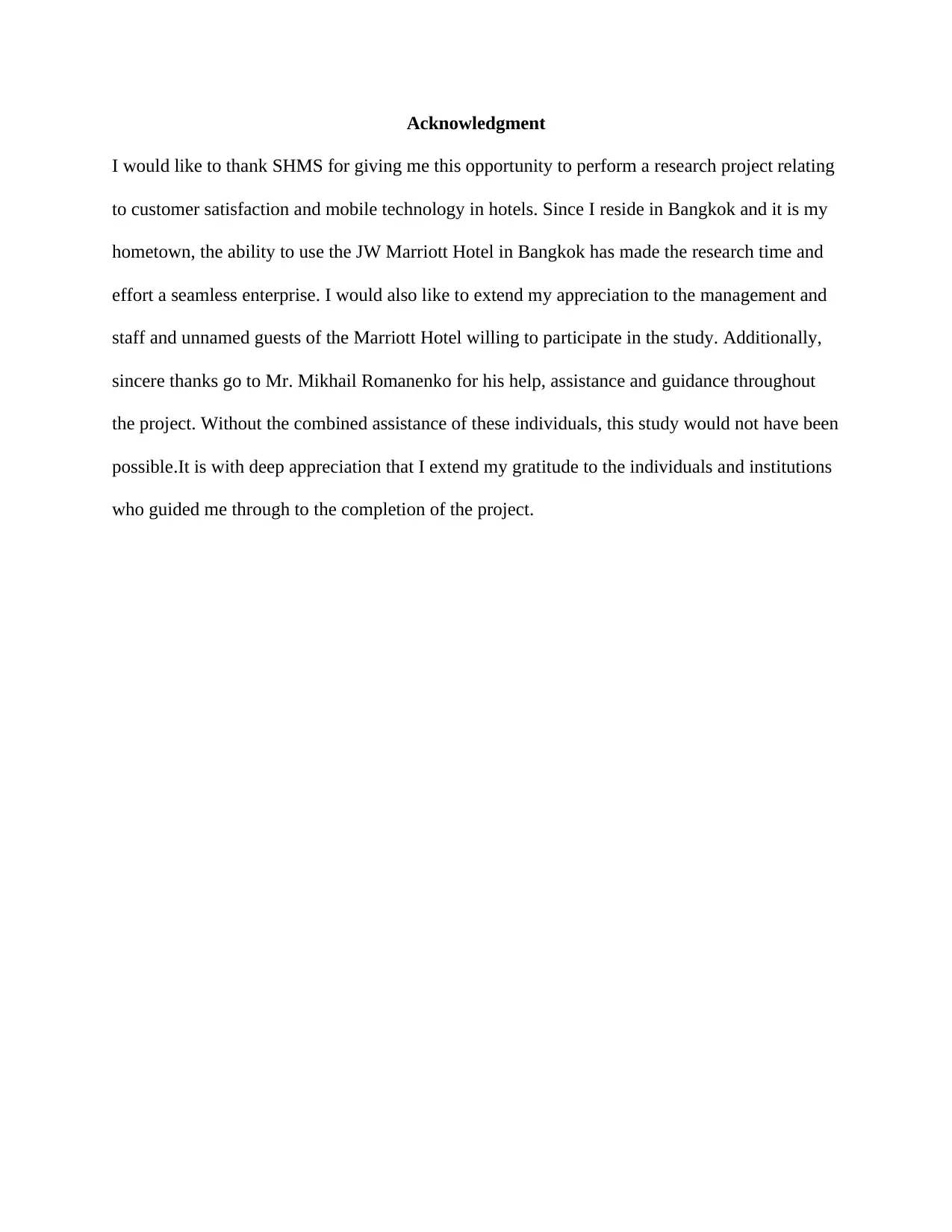
Acknowledgment
I would like to thank SHMS for giving me this opportunity to perform a research project relating
to customer satisfaction and mobile technology in hotels. Since I reside in Bangkok and it is my
hometown, the ability to use the JW Marriott Hotel in Bangkok has made the research time and
effort a seamless enterprise. I would also like to extend my appreciation to the management and
staff and unnamed guests of the Marriott Hotel willing to participate in the study. Additionally,
sincere thanks go to Mr. Mikhail Romanenko for his help, assistance and guidance throughout
the project. Without the combined assistance of these individuals, this study would not have been
possible.It is with deep appreciation that I extend my gratitude to the individuals and institutions
who guided me through to the completion of the project.
I would like to thank SHMS for giving me this opportunity to perform a research project relating
to customer satisfaction and mobile technology in hotels. Since I reside in Bangkok and it is my
hometown, the ability to use the JW Marriott Hotel in Bangkok has made the research time and
effort a seamless enterprise. I would also like to extend my appreciation to the management and
staff and unnamed guests of the Marriott Hotel willing to participate in the study. Additionally,
sincere thanks go to Mr. Mikhail Romanenko for his help, assistance and guidance throughout
the project. Without the combined assistance of these individuals, this study would not have been
possible.It is with deep appreciation that I extend my gratitude to the individuals and institutions
who guided me through to the completion of the project.

⊘ This is a preview!⊘
Do you want full access?
Subscribe today to unlock all pages.

Trusted by 1+ million students worldwide
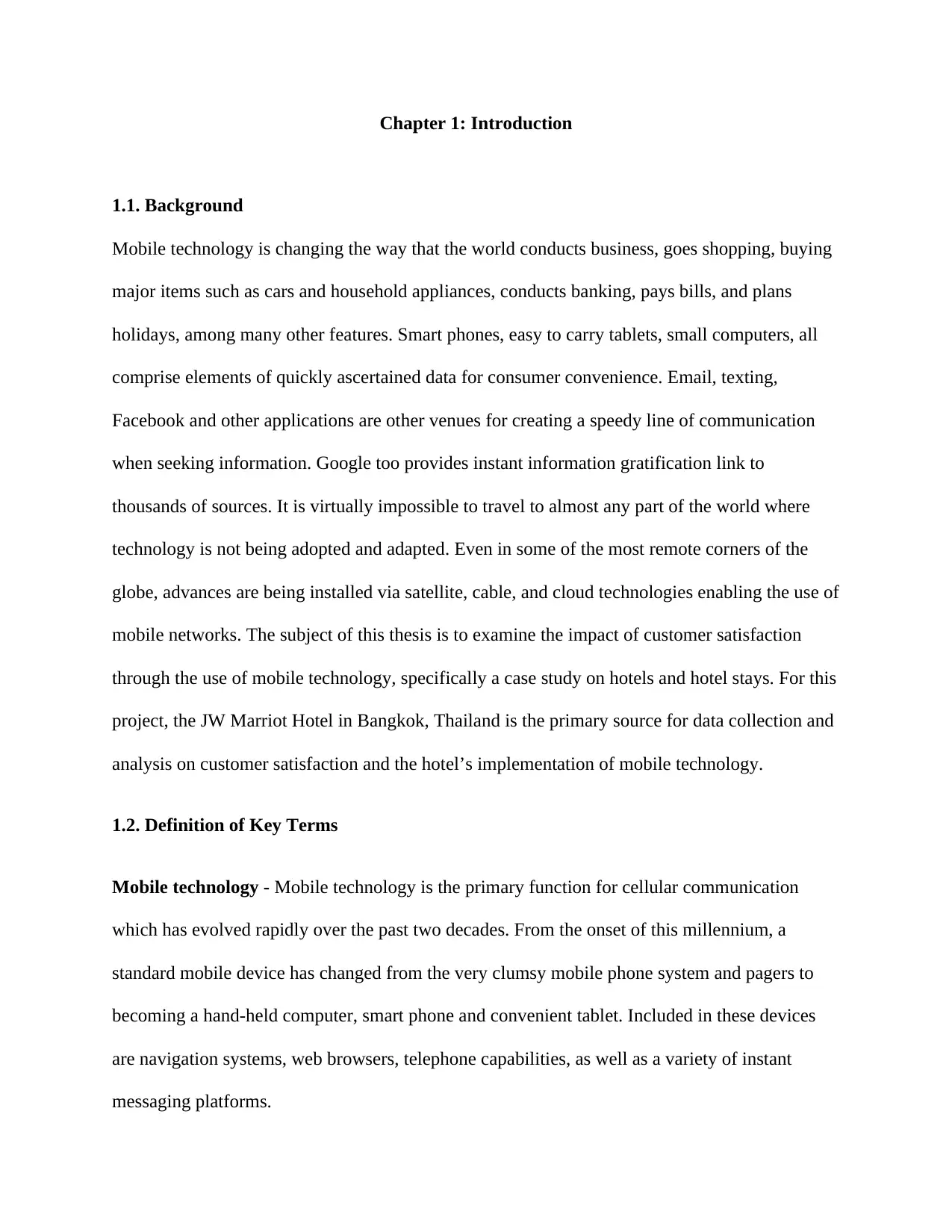
Chapter 1: Introduction
1.1. Background
Mobile technology is changing the way that the world conducts business, goes shopping, buying
major items such as cars and household appliances, conducts banking, pays bills, and plans
holidays, among many other features. Smart phones, easy to carry tablets, small computers, all
comprise elements of quickly ascertained data for consumer convenience. Email, texting,
Facebook and other applications are other venues for creating a speedy line of communication
when seeking information. Google too provides instant information gratification link to
thousands of sources. It is virtually impossible to travel to almost any part of the world where
technology is not being adopted and adapted. Even in some of the most remote corners of the
globe, advances are being installed via satellite, cable, and cloud technologies enabling the use of
mobile networks. The subject of this thesis is to examine the impact of customer satisfaction
through the use of mobile technology, specifically a case study on hotels and hotel stays. For this
project, the JW Marriot Hotel in Bangkok, Thailand is the primary source for data collection and
analysis on customer satisfaction and the hotel’s implementation of mobile technology.
1.2. Definition of Key Terms
Mobile technology - Mobile technology is the primary function for cellular communication
which has evolved rapidly over the past two decades. From the onset of this millennium, a
standard mobile device has changed from the very clumsy mobile phone system and pagers to
becoming a hand-held computer, smart phone and convenient tablet. Included in these devices
are navigation systems, web browsers, telephone capabilities, as well as a variety of instant
messaging platforms.
1.1. Background
Mobile technology is changing the way that the world conducts business, goes shopping, buying
major items such as cars and household appliances, conducts banking, pays bills, and plans
holidays, among many other features. Smart phones, easy to carry tablets, small computers, all
comprise elements of quickly ascertained data for consumer convenience. Email, texting,
Facebook and other applications are other venues for creating a speedy line of communication
when seeking information. Google too provides instant information gratification link to
thousands of sources. It is virtually impossible to travel to almost any part of the world where
technology is not being adopted and adapted. Even in some of the most remote corners of the
globe, advances are being installed via satellite, cable, and cloud technologies enabling the use of
mobile networks. The subject of this thesis is to examine the impact of customer satisfaction
through the use of mobile technology, specifically a case study on hotels and hotel stays. For this
project, the JW Marriot Hotel in Bangkok, Thailand is the primary source for data collection and
analysis on customer satisfaction and the hotel’s implementation of mobile technology.
1.2. Definition of Key Terms
Mobile technology - Mobile technology is the primary function for cellular communication
which has evolved rapidly over the past two decades. From the onset of this millennium, a
standard mobile device has changed from the very clumsy mobile phone system and pagers to
becoming a hand-held computer, smart phone and convenient tablet. Included in these devices
are navigation systems, web browsers, telephone capabilities, as well as a variety of instant
messaging platforms.
Paraphrase This Document
Need a fresh take? Get an instant paraphrase of this document with our AI Paraphraser
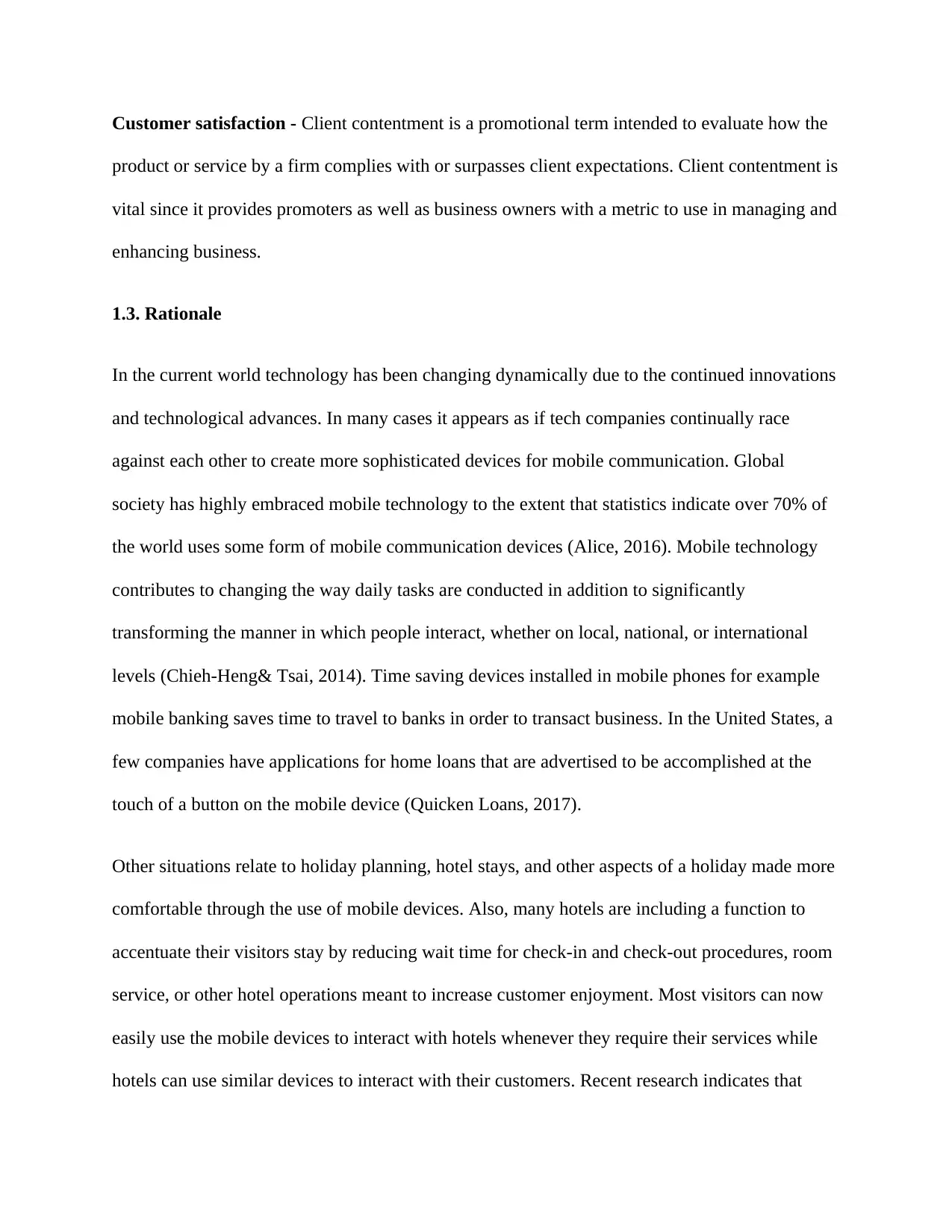
Customer satisfaction - Client contentment is a promotional term intended to evaluate how the
product or service by a firm complies with or surpasses client expectations. Client contentment is
vital since it provides promoters as well as business owners with a metric to use in managing and
enhancing business.
1.3. Rationale
In the current world technology has been changing dynamically due to the continued innovations
and technological advances. In many cases it appears as if tech companies continually race
against each other to create more sophisticated devices for mobile communication. Global
society has highly embraced mobile technology to the extent that statistics indicate over 70% of
the world uses some form of mobile communication devices (Alice, 2016). Mobile technology
contributes to changing the way daily tasks are conducted in addition to significantly
transforming the manner in which people interact, whether on local, national, or international
levels (Chieh-Heng& Tsai, 2014). Time saving devices installed in mobile phones for example
mobile banking saves time to travel to banks in order to transact business. In the United States, a
few companies have applications for home loans that are advertised to be accomplished at the
touch of a button on the mobile device (Quicken Loans, 2017).
Other situations relate to holiday planning, hotel stays, and other aspects of a holiday made more
comfortable through the use of mobile devices. Also, many hotels are including a function to
accentuate their visitors stay by reducing wait time for check-in and check-out procedures, room
service, or other hotel operations meant to increase customer enjoyment. Most visitors can now
easily use the mobile devices to interact with hotels whenever they require their services while
hotels can use similar devices to interact with their customers. Recent research indicates that
product or service by a firm complies with or surpasses client expectations. Client contentment is
vital since it provides promoters as well as business owners with a metric to use in managing and
enhancing business.
1.3. Rationale
In the current world technology has been changing dynamically due to the continued innovations
and technological advances. In many cases it appears as if tech companies continually race
against each other to create more sophisticated devices for mobile communication. Global
society has highly embraced mobile technology to the extent that statistics indicate over 70% of
the world uses some form of mobile communication devices (Alice, 2016). Mobile technology
contributes to changing the way daily tasks are conducted in addition to significantly
transforming the manner in which people interact, whether on local, national, or international
levels (Chieh-Heng& Tsai, 2014). Time saving devices installed in mobile phones for example
mobile banking saves time to travel to banks in order to transact business. In the United States, a
few companies have applications for home loans that are advertised to be accomplished at the
touch of a button on the mobile device (Quicken Loans, 2017).
Other situations relate to holiday planning, hotel stays, and other aspects of a holiday made more
comfortable through the use of mobile devices. Also, many hotels are including a function to
accentuate their visitors stay by reducing wait time for check-in and check-out procedures, room
service, or other hotel operations meant to increase customer enjoyment. Most visitors can now
easily use the mobile devices to interact with hotels whenever they require their services while
hotels can use similar devices to interact with their customers. Recent research indicates that
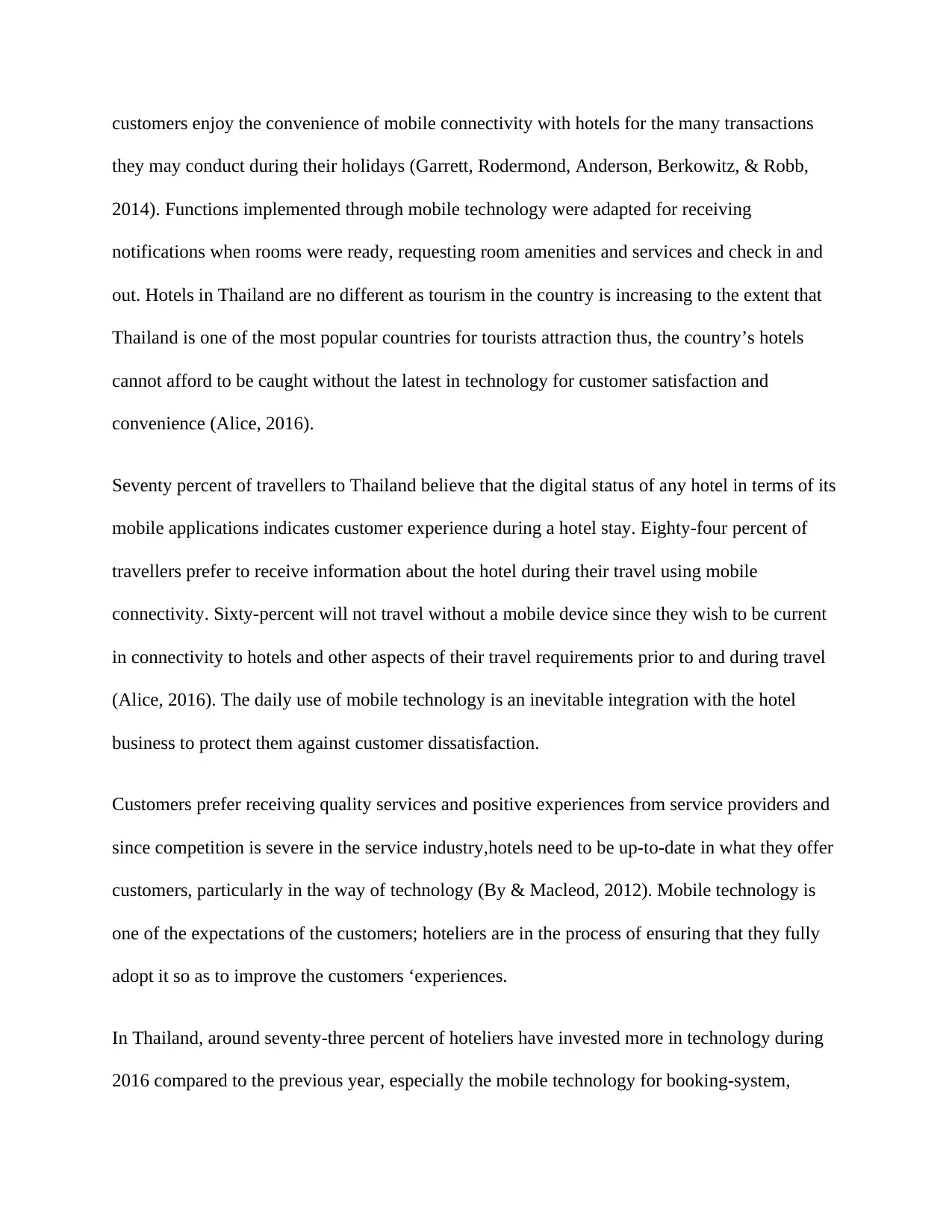
customers enjoy the convenience of mobile connectivity with hotels for the many transactions
they may conduct during their holidays (Garrett, Rodermond, Anderson, Berkowitz, & Robb,
2014). Functions implemented through mobile technology were adapted for receiving
notifications when rooms were ready, requesting room amenities and services and check in and
out. Hotels in Thailand are no different as tourism in the country is increasing to the extent that
Thailand is one of the most popular countries for tourists attraction thus, the country’s hotels
cannot afford to be caught without the latest in technology for customer satisfaction and
convenience (Alice, 2016).
Seventy percent of travellers to Thailand believe that the digital status of any hotel in terms of its
mobile applications indicates customer experience during a hotel stay. Eighty-four percent of
travellers prefer to receive information about the hotel during their travel using mobile
connectivity. Sixty-percent will not travel without a mobile device since they wish to be current
in connectivity to hotels and other aspects of their travel requirements prior to and during travel
(Alice, 2016). The daily use of mobile technology is an inevitable integration with the hotel
business to protect them against customer dissatisfaction.
Customers prefer receiving quality services and positive experiences from service providers and
since competition is severe in the service industry,hotels need to be up-to-date in what they offer
customers, particularly in the way of technology (By & Macleod, 2012). Mobile technology is
one of the expectations of the customers; hoteliers are in the process of ensuring that they fully
adopt it so as to improve the customers ‘experiences.
In Thailand, around seventy-three percent of hoteliers have invested more in technology during
2016 compared to the previous year, especially the mobile technology for booking-system,
they may conduct during their holidays (Garrett, Rodermond, Anderson, Berkowitz, & Robb,
2014). Functions implemented through mobile technology were adapted for receiving
notifications when rooms were ready, requesting room amenities and services and check in and
out. Hotels in Thailand are no different as tourism in the country is increasing to the extent that
Thailand is one of the most popular countries for tourists attraction thus, the country’s hotels
cannot afford to be caught without the latest in technology for customer satisfaction and
convenience (Alice, 2016).
Seventy percent of travellers to Thailand believe that the digital status of any hotel in terms of its
mobile applications indicates customer experience during a hotel stay. Eighty-four percent of
travellers prefer to receive information about the hotel during their travel using mobile
connectivity. Sixty-percent will not travel without a mobile device since they wish to be current
in connectivity to hotels and other aspects of their travel requirements prior to and during travel
(Alice, 2016). The daily use of mobile technology is an inevitable integration with the hotel
business to protect them against customer dissatisfaction.
Customers prefer receiving quality services and positive experiences from service providers and
since competition is severe in the service industry,hotels need to be up-to-date in what they offer
customers, particularly in the way of technology (By & Macleod, 2012). Mobile technology is
one of the expectations of the customers; hoteliers are in the process of ensuring that they fully
adopt it so as to improve the customers ‘experiences.
In Thailand, around seventy-three percent of hoteliers have invested more in technology during
2016 compared to the previous year, especially the mobile technology for booking-system,
⊘ This is a preview!⊘
Do you want full access?
Subscribe today to unlock all pages.

Trusted by 1+ million students worldwide
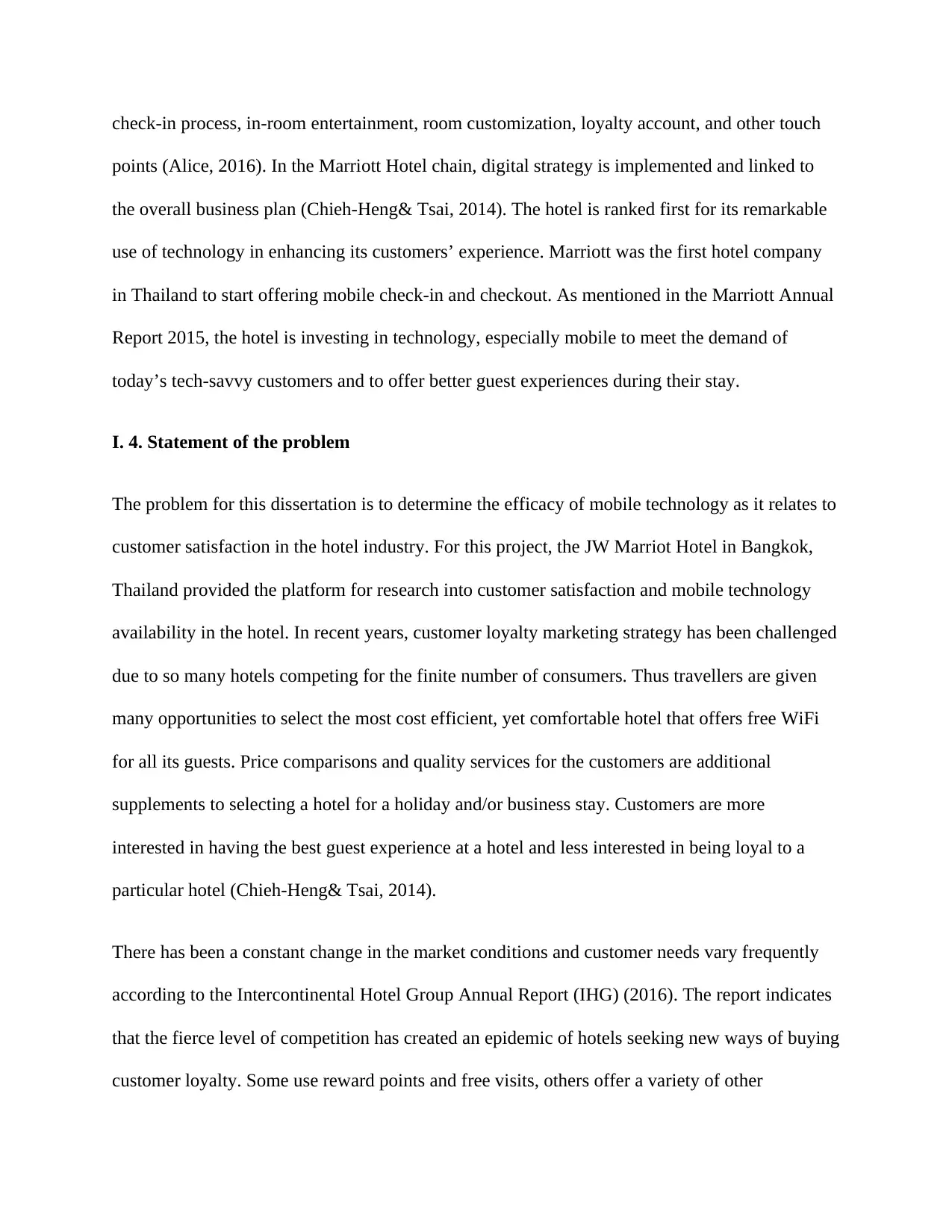
check-in process, in-room entertainment, room customization, loyalty account, and other touch
points (Alice, 2016). In the Marriott Hotel chain, digital strategy is implemented and linked to
the overall business plan (Chieh-Heng& Tsai, 2014). The hotel is ranked first for its remarkable
use of technology in enhancing its customers’ experience. Marriott was the first hotel company
in Thailand to start offering mobile check-in and checkout. As mentioned in the Marriott Annual
Report 2015, the hotel is investing in technology, especially mobile to meet the demand of
today’s tech-savvy customers and to offer better guest experiences during their stay.
I. 4. Statement of the problem
The problem for this dissertation is to determine the efficacy of mobile technology as it relates to
customer satisfaction in the hotel industry. For this project, the JW Marriot Hotel in Bangkok,
Thailand provided the platform for research into customer satisfaction and mobile technology
availability in the hotel. In recent years, customer loyalty marketing strategy has been challenged
due to so many hotels competing for the finite number of consumers. Thus travellers are given
many opportunities to select the most cost efficient, yet comfortable hotel that offers free WiFi
for all its guests. Price comparisons and quality services for the customers are additional
supplements to selecting a hotel for a holiday and/or business stay. Customers are more
interested in having the best guest experience at a hotel and less interested in being loyal to a
particular hotel (Chieh-Heng& Tsai, 2014).
There has been a constant change in the market conditions and customer needs vary frequently
according to the Intercontinental Hotel Group Annual Report (IHG) (2016). The report indicates
that the fierce level of competition has created an epidemic of hotels seeking new ways of buying
customer loyalty. Some use reward points and free visits, others offer a variety of other
points (Alice, 2016). In the Marriott Hotel chain, digital strategy is implemented and linked to
the overall business plan (Chieh-Heng& Tsai, 2014). The hotel is ranked first for its remarkable
use of technology in enhancing its customers’ experience. Marriott was the first hotel company
in Thailand to start offering mobile check-in and checkout. As mentioned in the Marriott Annual
Report 2015, the hotel is investing in technology, especially mobile to meet the demand of
today’s tech-savvy customers and to offer better guest experiences during their stay.
I. 4. Statement of the problem
The problem for this dissertation is to determine the efficacy of mobile technology as it relates to
customer satisfaction in the hotel industry. For this project, the JW Marriot Hotel in Bangkok,
Thailand provided the platform for research into customer satisfaction and mobile technology
availability in the hotel. In recent years, customer loyalty marketing strategy has been challenged
due to so many hotels competing for the finite number of consumers. Thus travellers are given
many opportunities to select the most cost efficient, yet comfortable hotel that offers free WiFi
for all its guests. Price comparisons and quality services for the customers are additional
supplements to selecting a hotel for a holiday and/or business stay. Customers are more
interested in having the best guest experience at a hotel and less interested in being loyal to a
particular hotel (Chieh-Heng& Tsai, 2014).
There has been a constant change in the market conditions and customer needs vary frequently
according to the Intercontinental Hotel Group Annual Report (IHG) (2016). The report indicates
that the fierce level of competition has created an epidemic of hotels seeking new ways of buying
customer loyalty. Some use reward points and free visits, others offer a variety of other
Paraphrase This Document
Need a fresh take? Get an instant paraphrase of this document with our AI Paraphraser
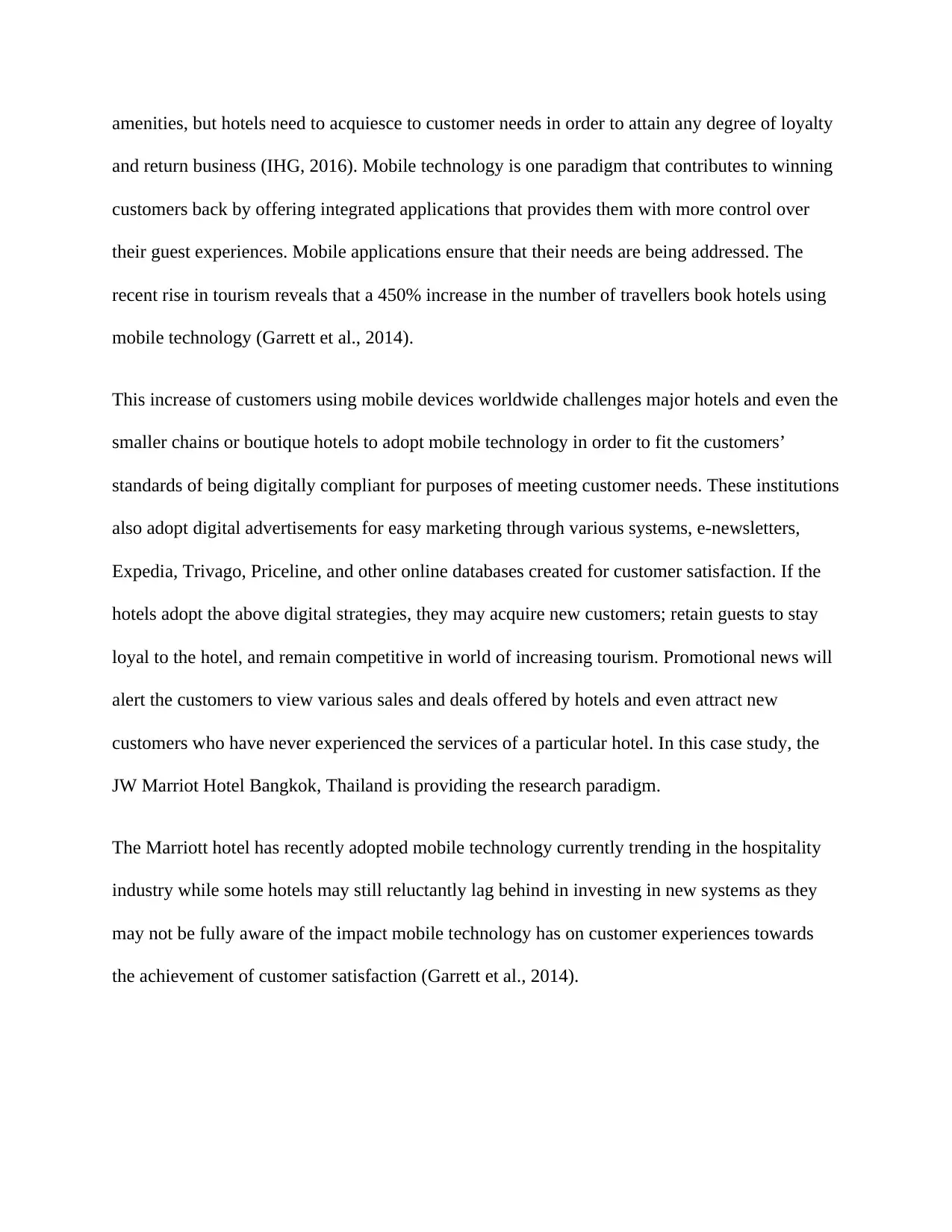
amenities, but hotels need to acquiesce to customer needs in order to attain any degree of loyalty
and return business (IHG, 2016). Mobile technology is one paradigm that contributes to winning
customers back by offering integrated applications that provides them with more control over
their guest experiences. Mobile applications ensure that their needs are being addressed. The
recent rise in tourism reveals that a 450% increase in the number of travellers book hotels using
mobile technology (Garrett et al., 2014).
This increase of customers using mobile devices worldwide challenges major hotels and even the
smaller chains or boutique hotels to adopt mobile technology in order to fit the customers’
standards of being digitally compliant for purposes of meeting customer needs. These institutions
also adopt digital advertisements for easy marketing through various systems, e-newsletters,
Expedia, Trivago, Priceline, and other online databases created for customer satisfaction. If the
hotels adopt the above digital strategies, they may acquire new customers; retain guests to stay
loyal to the hotel, and remain competitive in world of increasing tourism. Promotional news will
alert the customers to view various sales and deals offered by hotels and even attract new
customers who have never experienced the services of a particular hotel. In this case study, the
JW Marriot Hotel Bangkok, Thailand is providing the research paradigm.
The Marriott hotel has recently adopted mobile technology currently trending in the hospitality
industry while some hotels may still reluctantly lag behind in investing in new systems as they
may not be fully aware of the impact mobile technology has on customer experiences towards
the achievement of customer satisfaction (Garrett et al., 2014).
and return business (IHG, 2016). Mobile technology is one paradigm that contributes to winning
customers back by offering integrated applications that provides them with more control over
their guest experiences. Mobile applications ensure that their needs are being addressed. The
recent rise in tourism reveals that a 450% increase in the number of travellers book hotels using
mobile technology (Garrett et al., 2014).
This increase of customers using mobile devices worldwide challenges major hotels and even the
smaller chains or boutique hotels to adopt mobile technology in order to fit the customers’
standards of being digitally compliant for purposes of meeting customer needs. These institutions
also adopt digital advertisements for easy marketing through various systems, e-newsletters,
Expedia, Trivago, Priceline, and other online databases created for customer satisfaction. If the
hotels adopt the above digital strategies, they may acquire new customers; retain guests to stay
loyal to the hotel, and remain competitive in world of increasing tourism. Promotional news will
alert the customers to view various sales and deals offered by hotels and even attract new
customers who have never experienced the services of a particular hotel. In this case study, the
JW Marriot Hotel Bangkok, Thailand is providing the research paradigm.
The Marriott hotel has recently adopted mobile technology currently trending in the hospitality
industry while some hotels may still reluctantly lag behind in investing in new systems as they
may not be fully aware of the impact mobile technology has on customer experiences towards
the achievement of customer satisfaction (Garrett et al., 2014).
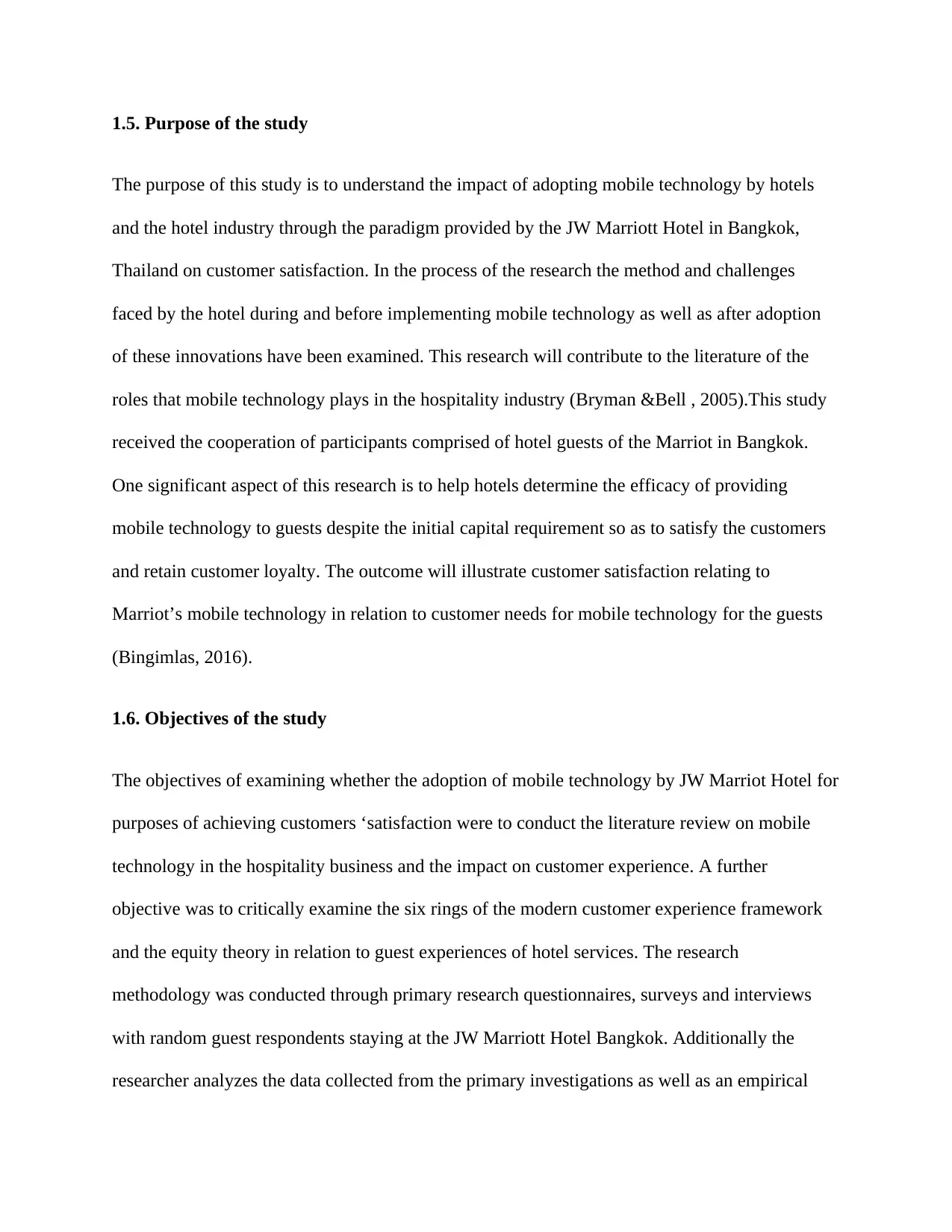
1.5. Purpose of the study
The purpose of this study is to understand the impact of adopting mobile technology by hotels
and the hotel industry through the paradigm provided by the JW Marriott Hotel in Bangkok,
Thailand on customer satisfaction. In the process of the research the method and challenges
faced by the hotel during and before implementing mobile technology as well as after adoption
of these innovations have been examined. This research will contribute to the literature of the
roles that mobile technology plays in the hospitality industry (Bryman &Bell , 2005).This study
received the cooperation of participants comprised of hotel guests of the Marriot in Bangkok.
One significant aspect of this research is to help hotels determine the efficacy of providing
mobile technology to guests despite the initial capital requirement so as to satisfy the customers
and retain customer loyalty. The outcome will illustrate customer satisfaction relating to
Marriot’s mobile technology in relation to customer needs for mobile technology for the guests
(Bingimlas, 2016).
1.6. Objectives of the study
The objectives of examining whether the adoption of mobile technology by JW Marriot Hotel for
purposes of achieving customers ‘satisfaction were to conduct the literature review on mobile
technology in the hospitality business and the impact on customer experience. A further
objective was to critically examine the six rings of the modern customer experience framework
and the equity theory in relation to guest experiences of hotel services. The research
methodology was conducted through primary research questionnaires, surveys and interviews
with random guest respondents staying at the JW Marriott Hotel Bangkok. Additionally the
researcher analyzes the data collected from the primary investigations as well as an empirical
The purpose of this study is to understand the impact of adopting mobile technology by hotels
and the hotel industry through the paradigm provided by the JW Marriott Hotel in Bangkok,
Thailand on customer satisfaction. In the process of the research the method and challenges
faced by the hotel during and before implementing mobile technology as well as after adoption
of these innovations have been examined. This research will contribute to the literature of the
roles that mobile technology plays in the hospitality industry (Bryman &Bell , 2005).This study
received the cooperation of participants comprised of hotel guests of the Marriot in Bangkok.
One significant aspect of this research is to help hotels determine the efficacy of providing
mobile technology to guests despite the initial capital requirement so as to satisfy the customers
and retain customer loyalty. The outcome will illustrate customer satisfaction relating to
Marriot’s mobile technology in relation to customer needs for mobile technology for the guests
(Bingimlas, 2016).
1.6. Objectives of the study
The objectives of examining whether the adoption of mobile technology by JW Marriot Hotel for
purposes of achieving customers ‘satisfaction were to conduct the literature review on mobile
technology in the hospitality business and the impact on customer experience. A further
objective was to critically examine the six rings of the modern customer experience framework
and the equity theory in relation to guest experiences of hotel services. The research
methodology was conducted through primary research questionnaires, surveys and interviews
with random guest respondents staying at the JW Marriott Hotel Bangkok. Additionally the
researcher analyzes the data collected from the primary investigations as well as an empirical
⊘ This is a preview!⊘
Do you want full access?
Subscribe today to unlock all pages.

Trusted by 1+ million students worldwide
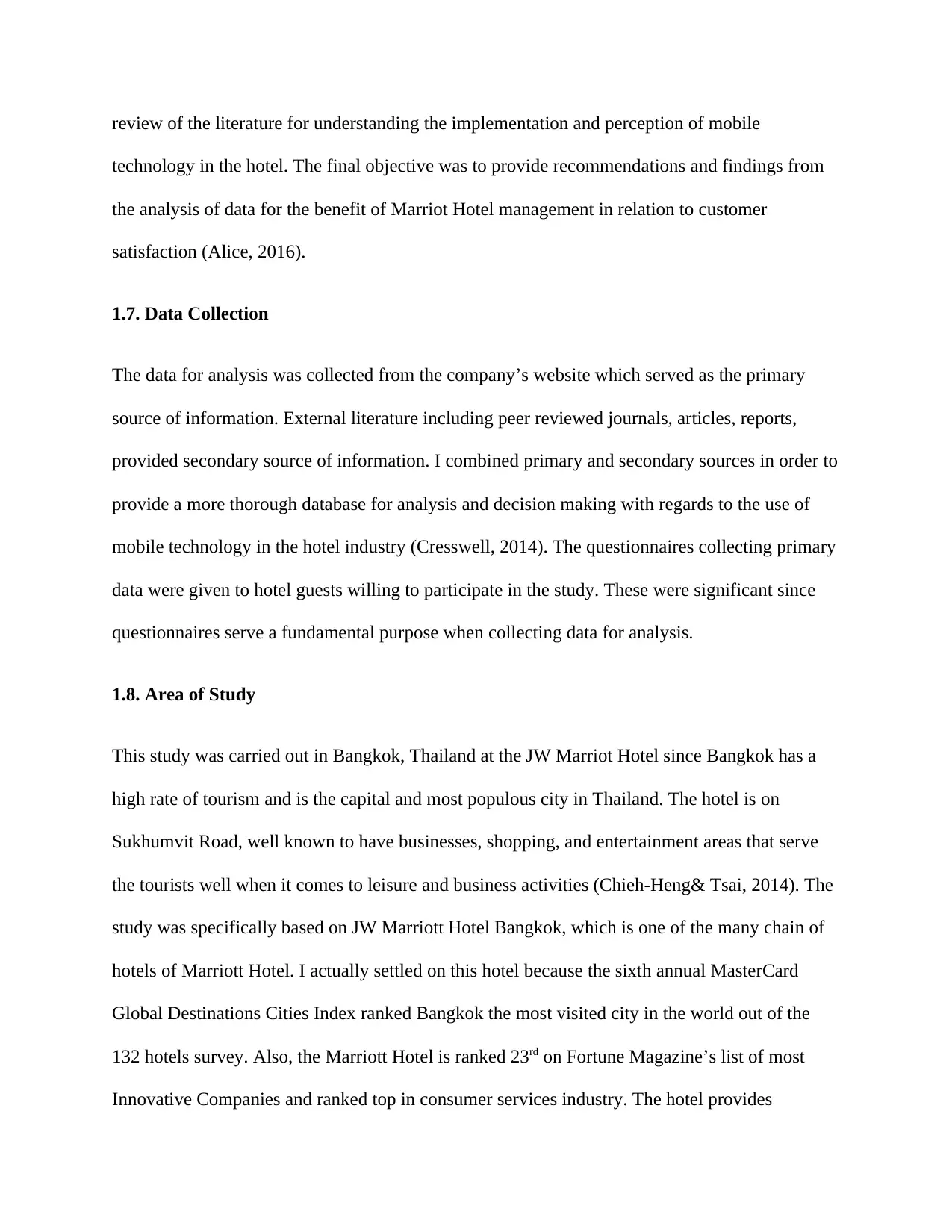
review of the literature for understanding the implementation and perception of mobile
technology in the hotel. The final objective was to provide recommendations and findings from
the analysis of data for the benefit of Marriot Hotel management in relation to customer
satisfaction (Alice, 2016).
1.7. Data Collection
The data for analysis was collected from the company’s website which served as the primary
source of information. External literature including peer reviewed journals, articles, reports,
provided secondary source of information. I combined primary and secondary sources in order to
provide a more thorough database for analysis and decision making with regards to the use of
mobile technology in the hotel industry (Cresswell, 2014). The questionnaires collecting primary
data were given to hotel guests willing to participate in the study. These were significant since
questionnaires serve a fundamental purpose when collecting data for analysis.
1.8. Area of Study
This study was carried out in Bangkok, Thailand at the JW Marriot Hotel since Bangkok has a
high rate of tourism and is the capital and most populous city in Thailand. The hotel is on
Sukhumvit Road, well known to have businesses, shopping, and entertainment areas that serve
the tourists well when it comes to leisure and business activities (Chieh-Heng& Tsai, 2014). The
study was specifically based on JW Marriott Hotel Bangkok, which is one of the many chain of
hotels of Marriott Hotel. I actually settled on this hotel because the sixth annual MasterCard
Global Destinations Cities Index ranked Bangkok the most visited city in the world out of the
132 hotels survey. Also, the Marriott Hotel is ranked 23rd on Fortune Magazine’s list of most
Innovative Companies and ranked top in consumer services industry. The hotel provides
technology in the hotel. The final objective was to provide recommendations and findings from
the analysis of data for the benefit of Marriot Hotel management in relation to customer
satisfaction (Alice, 2016).
1.7. Data Collection
The data for analysis was collected from the company’s website which served as the primary
source of information. External literature including peer reviewed journals, articles, reports,
provided secondary source of information. I combined primary and secondary sources in order to
provide a more thorough database for analysis and decision making with regards to the use of
mobile technology in the hotel industry (Cresswell, 2014). The questionnaires collecting primary
data were given to hotel guests willing to participate in the study. These were significant since
questionnaires serve a fundamental purpose when collecting data for analysis.
1.8. Area of Study
This study was carried out in Bangkok, Thailand at the JW Marriot Hotel since Bangkok has a
high rate of tourism and is the capital and most populous city in Thailand. The hotel is on
Sukhumvit Road, well known to have businesses, shopping, and entertainment areas that serve
the tourists well when it comes to leisure and business activities (Chieh-Heng& Tsai, 2014). The
study was specifically based on JW Marriott Hotel Bangkok, which is one of the many chain of
hotels of Marriott Hotel. I actually settled on this hotel because the sixth annual MasterCard
Global Destinations Cities Index ranked Bangkok the most visited city in the world out of the
132 hotels survey. Also, the Marriott Hotel is ranked 23rd on Fortune Magazine’s list of most
Innovative Companies and ranked top in consumer services industry. The hotel provides
Paraphrase This Document
Need a fresh take? Get an instant paraphrase of this document with our AI Paraphraser
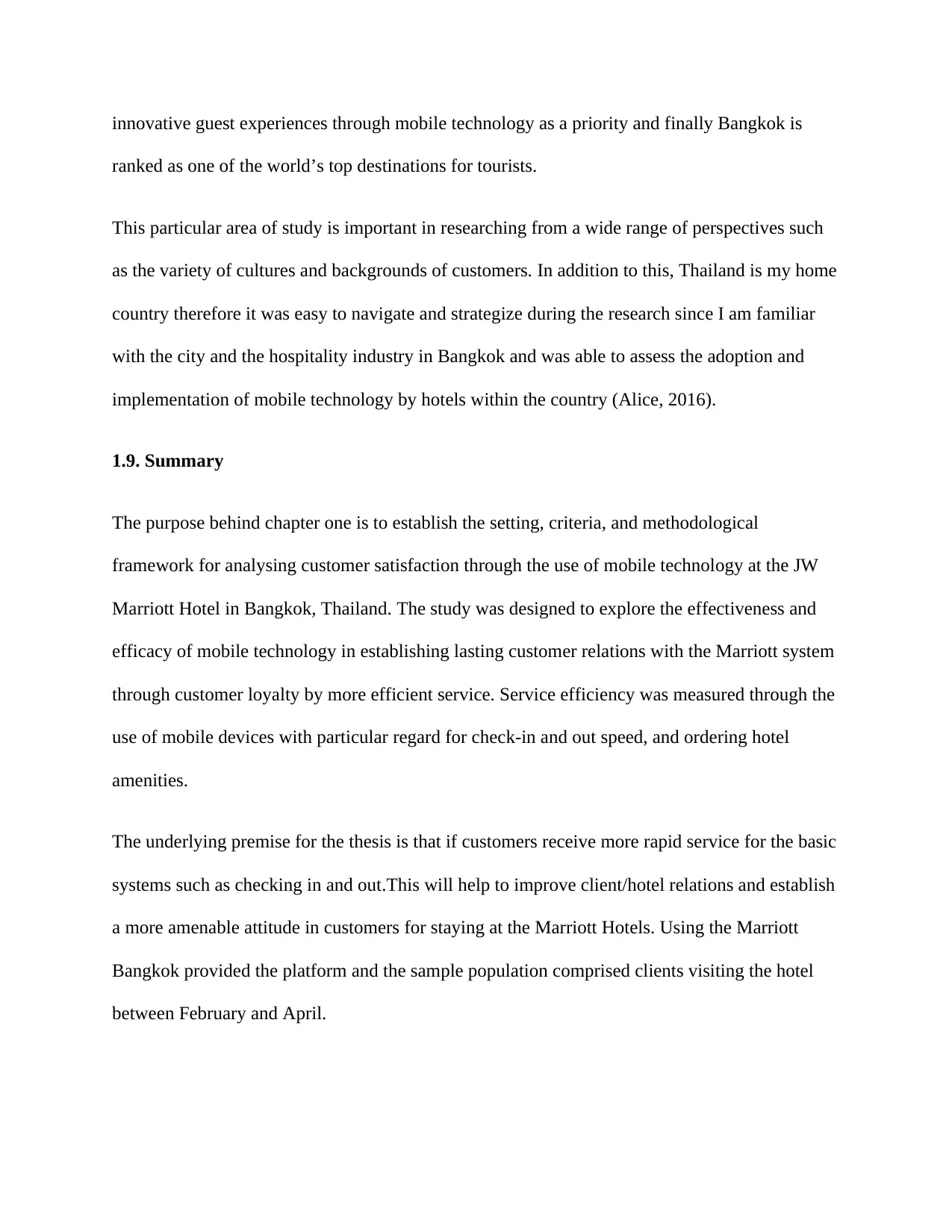
innovative guest experiences through mobile technology as a priority and finally Bangkok is
ranked as one of the world’s top destinations for tourists.
This particular area of study is important in researching from a wide range of perspectives such
as the variety of cultures and backgrounds of customers. In addition to this, Thailand is my home
country therefore it was easy to navigate and strategize during the research since I am familiar
with the city and the hospitality industry in Bangkok and was able to assess the adoption and
implementation of mobile technology by hotels within the country (Alice, 2016).
1.9. Summary
The purpose behind chapter one is to establish the setting, criteria, and methodological
framework for analysing customer satisfaction through the use of mobile technology at the JW
Marriott Hotel in Bangkok, Thailand. The study was designed to explore the effectiveness and
efficacy of mobile technology in establishing lasting customer relations with the Marriott system
through customer loyalty by more efficient service. Service efficiency was measured through the
use of mobile devices with particular regard for check-in and out speed, and ordering hotel
amenities.
The underlying premise for the thesis is that if customers receive more rapid service for the basic
systems such as checking in and out.This will help to improve client/hotel relations and establish
a more amenable attitude in customers for staying at the Marriott Hotels. Using the Marriott
Bangkok provided the platform and the sample population comprised clients visiting the hotel
between February and April.
ranked as one of the world’s top destinations for tourists.
This particular area of study is important in researching from a wide range of perspectives such
as the variety of cultures and backgrounds of customers. In addition to this, Thailand is my home
country therefore it was easy to navigate and strategize during the research since I am familiar
with the city and the hospitality industry in Bangkok and was able to assess the adoption and
implementation of mobile technology by hotels within the country (Alice, 2016).
1.9. Summary
The purpose behind chapter one is to establish the setting, criteria, and methodological
framework for analysing customer satisfaction through the use of mobile technology at the JW
Marriott Hotel in Bangkok, Thailand. The study was designed to explore the effectiveness and
efficacy of mobile technology in establishing lasting customer relations with the Marriott system
through customer loyalty by more efficient service. Service efficiency was measured through the
use of mobile devices with particular regard for check-in and out speed, and ordering hotel
amenities.
The underlying premise for the thesis is that if customers receive more rapid service for the basic
systems such as checking in and out.This will help to improve client/hotel relations and establish
a more amenable attitude in customers for staying at the Marriott Hotels. Using the Marriott
Bangkok provided the platform and the sample population comprised clients visiting the hotel
between February and April.
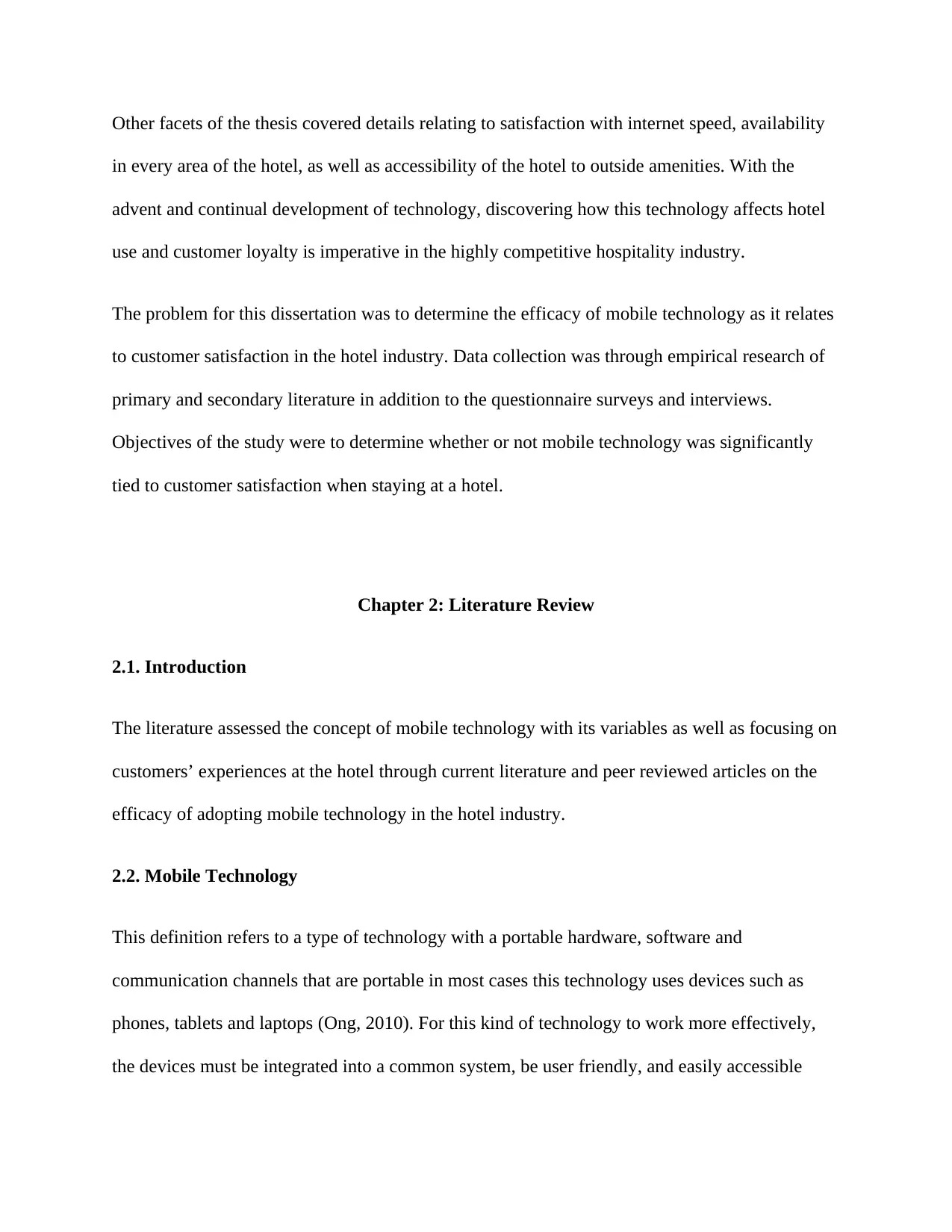
Other facets of the thesis covered details relating to satisfaction with internet speed, availability
in every area of the hotel, as well as accessibility of the hotel to outside amenities. With the
advent and continual development of technology, discovering how this technology affects hotel
use and customer loyalty is imperative in the highly competitive hospitality industry.
The problem for this dissertation was to determine the efficacy of mobile technology as it relates
to customer satisfaction in the hotel industry. Data collection was through empirical research of
primary and secondary literature in addition to the questionnaire surveys and interviews.
Objectives of the study were to determine whether or not mobile technology was significantly
tied to customer satisfaction when staying at a hotel.
Chapter 2: Literature Review
2.1. Introduction
The literature assessed the concept of mobile technology with its variables as well as focusing on
customers’ experiences at the hotel through current literature and peer reviewed articles on the
efficacy of adopting mobile technology in the hotel industry.
2.2. Mobile Technology
This definition refers to a type of technology with a portable hardware, software and
communication channels that are portable in most cases this technology uses devices such as
phones, tablets and laptops (Ong, 2010). For this kind of technology to work more effectively,
the devices must be integrated into a common system, be user friendly, and easily accessible
in every area of the hotel, as well as accessibility of the hotel to outside amenities. With the
advent and continual development of technology, discovering how this technology affects hotel
use and customer loyalty is imperative in the highly competitive hospitality industry.
The problem for this dissertation was to determine the efficacy of mobile technology as it relates
to customer satisfaction in the hotel industry. Data collection was through empirical research of
primary and secondary literature in addition to the questionnaire surveys and interviews.
Objectives of the study were to determine whether or not mobile technology was significantly
tied to customer satisfaction when staying at a hotel.
Chapter 2: Literature Review
2.1. Introduction
The literature assessed the concept of mobile technology with its variables as well as focusing on
customers’ experiences at the hotel through current literature and peer reviewed articles on the
efficacy of adopting mobile technology in the hotel industry.
2.2. Mobile Technology
This definition refers to a type of technology with a portable hardware, software and
communication channels that are portable in most cases this technology uses devices such as
phones, tablets and laptops (Ong, 2010). For this kind of technology to work more effectively,
the devices must be integrated into a common system, be user friendly, and easily accessible
⊘ This is a preview!⊘
Do you want full access?
Subscribe today to unlock all pages.

Trusted by 1+ million students worldwide
1 out of 52
Related Documents
Your All-in-One AI-Powered Toolkit for Academic Success.
+13062052269
info@desklib.com
Available 24*7 on WhatsApp / Email
![[object Object]](/_next/static/media/star-bottom.7253800d.svg)
Unlock your academic potential
Copyright © 2020–2026 A2Z Services. All Rights Reserved. Developed and managed by ZUCOL.





